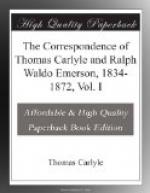In summer, with the aid of a neighbor, I manage my garden; and a week ago I set out on the west side of my house forty young pine trees to protect me or my son from the wind of January. The ornament of the place is the occasional presence of some ten or twelve persons, good and wise, who visit us in the course of the year.—But my story is too long already. God grant that you will come and bring that blessed wife, whose protracted illness we heartily grieve to learn, and whom a voyage and my wife’s and my mother’s nursing would in less than a twelvemonth restore to blooming health. My wife sends to her this message: “Come, and I will be to you a sister.” What have you to do with Italy? Your genius tendeth to the New, to the West. Come and live with me a year, and if you do not like New England well enough to stay, one of these years (when the History has passed its ten editions, and been translated into as many languages) I will come and dwell with you.
I gladly hear what you say of Sterling. I am foolish enough to be delighted with being an object of kindness to a man I have never seen, and who has not seen me. I have not yet got the Blackwood for March, which I long to see, but the other three papers I have read with great satisfaction. They lie here on my table. But he must get well.
As to Miss Martineau, I know not well what to say. Meaning to do me a signal kindness (and a kindness quite out of all measure of justice) she does me a great annoyance,—to take away from me my privacy and thrust me before my time (if ever there be a time) into the arena of the gladiators to be stared at. I was ashamed to read, and am ashamed to remember. Yet, as you see her, I would not be wanting in gratitude to a gifted and generous lady who so liberally transfigures our demerits. So you shall tell her, if you please, that I read all her book with pleasure but that part, and if ever I shall travel West or South, I think she has furnished me with the eyes. Farewell, dear wise man. I think your poverty honorable above the common brightness of that thorn-crown of the great. It earns you the love of men and the praise of a thousand years. Yet I hope the angelical Beldame, all-helping, all-hated, has given you her last lessons, and, finding you so striding a proficient, will dismiss you to a hundred editions and the adoration of the booksellers.
—R.W. Emerson
I have never heard from Rich, who, you wrote, had sent his account to me. Let him direct to me at Concord.
A young engineer in Cambridge, by name McKean,* volunteers his services in correcting the proofs of the Miscellanies,—and he has your errata,—for the love of the reading. Shall we have anthracite coal or wood in your chamber? My old mother is glad you are coming.
----------- * The late Mr. Henry S. McKean, a son of Professor McKean, and a graduate of Harvard College in 1828. -----------




